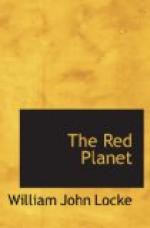The incident, as I say, was trivial, but it had deep symbolic significance. All symbols in their literal objectivity are trivial. What more trivial than the eating of a bit of bread and the sipping from a cup of wine? This trumpery business with the cigarette revolutionised my whole feelings towards Boyce. It initiated us into a sacred brotherhood. Hitherto, it had been his nature which had reached out towards me tentacles of despair. My inner self, as I have tried to show you, had never responded. It was restrained by all kinds of doubts, suspicions, and repulsions. Now, suddenly, it broke through all those barriers and rushed forth to meet him. My death in life against which I had fought, I hope like a brave man (it takes a bit of fighting) for many years, would henceforth be his death in life, at whose terrors he too would have to snap a disdainful finger. I had felt deep pity for him; but if pity is indeed akin to love, it is a very poor relation. Now I had cast pity and such like superior sentiment aside and accepted him as a sworn brother. The sins, whatever they were, that lay on the man’s conscience mattered nothing. He had paid in splendid penance and in terrible penalty.
I should have liked to express to him something of this surge of emotion. But I could find no words. As a race, our emotions are not facile, and therefore we lack the necessary practice in expressing them. When they do come, they come all of a heap and scare us out of our wits and leave us speechless. So the immediate outcome of all this psychological upheaval was that we went on smoking and said nothing more about it. As far as I remember we started talking about the recruiting muddle, as to which our views most vigorously coincided.
We parted cheerily. It was only when I got outside the room that the ghastly irony of the situation again made my heart as lead. We passed by the conservatory and the statuary and down the great staircase, but the ghosts had gone. Yet I cast a wistful glance at the spot—it was just under that Cuyp with the flashing white horse—where we had sat twenty years ago. But the new tragedy had rendered the memory less poignant.
“It’s a dreadful thing about the Colonel, sir,” said Marigold as we drove off.
“More dreadful than anyone can imagine,” said I.
“What he’s going to do with himself is what I’m wondering,” said Marigold.
What indeed? The question went infinitely deeper than the practical dreams of Marigold’s philosophy. My honest fellow saw but the outside—the full-blooded man of action cabined in his lifelong darkness. I, to whom chance had revealed more, trembled at the contemplation of his future. The man, goaded by the Furies, had rushed into the jaws of death. Those jaws, by some divine ordinance, had ruthlessly closed against him. The Furies meanwhile attended him unrelenting. Whither now would they goad him? Into madness? I doubted




